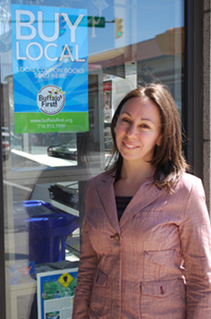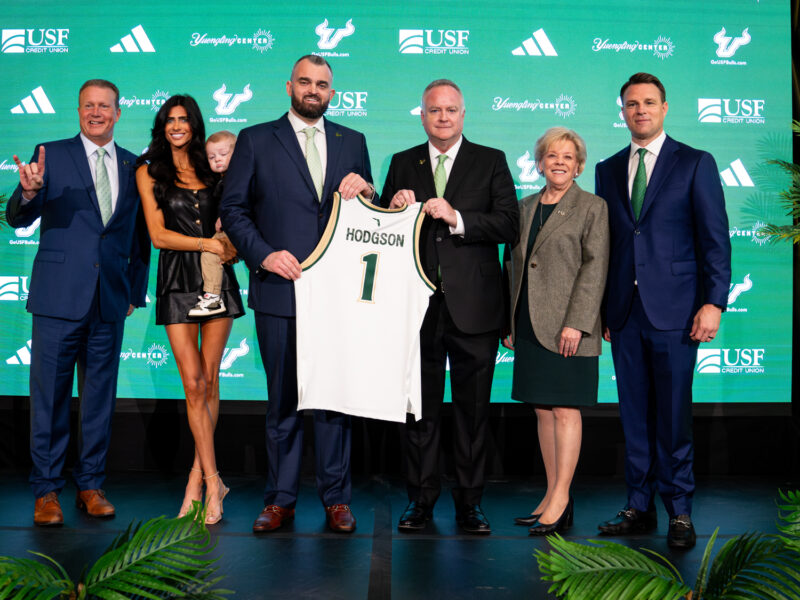
A university is like an island. It’s budding with resources, but the resources are immobile; landlocked. It’s Dr. Amy Kedron’s goal to get her students off the island.
Through her course, Community Leadership and Nonprofit Organizations, Kedron connects USF St. Petersburg students with local businesses and organizations, giving them opportunities to lead and promote development in the nonprofit sector.
“There’s a lot of untapped potential here and a lot of untapped resources,” Kedron said. She explained the importance of mobilizing the resources of richer sectors of the community, such as USFSP, and using them to stimulate growth in other, less developed areas. By partnering with local nonprofit organizations, and in some cases, starting their own, this is exactly what Kedron’s students accomplish.
A Buffalo native, Kedron has a solid background in nonprofit work. In 2006, she founded Buffalo First, an organization comprised of independent businesses and concerned citizens focused on promoting a local, green and fair economy in the Buffalo area. After coming south for personal reasons, Kedron fell in love with St. Petersburg and decided to stay.
…
On a sunny Friday afternoon, Kedron, clad in pink, sips coffee from a generously sized Café du Monde mug outside the Campus Grind. Across from her sits Kevin Blossfeld, a finance student and veteran of Kedron’s nonprofit leadership course.
As Kedron advises Blossfeld on his next endeavor in the charitable realm, she tells him, “Keep it simple. Keep it real simple.”
At the heart of Kedron’s course is capacity building # taking a business or organization and making it stronger.
In the introductory course taught last semester, Kedron guided students through partnerships with local nonprofits in which they aimed to strengthen the organization as tangible assets, rather than simply offering volunteer hours.
Along with a few other students, Blossfeld developed U-Impact.org, a website that displays what Kedron’s students have accomplished and how their efforts have impacted the community.
The website explains that Kedron’s students learn by doing. They study nonprofit management theory by partnering with nearby nonprofit organizations, attending board meetings, daily programs and events, all while observing the inner workings of the charitable sector.
Blossfeld reveres Kedron as one of the top professors he’s studied under. “This university is better for having her,” he said.
He explained that while Kedron’s class has a sound academic structure, its community aspect gives it a potential that other classes lack # unpredictability. “You never know what’s going to happen,” he said.
Students who took Kedron’s introductory course last semester requested an advanced version of it be added. They secured approval just in time for spring. While the original course equipped students with basic skills for nonprofit work, the advanced course takes students to the next level, giving them a chance to lead, Kedron explained. The 14 students enrolled will still partner with local organizations in the community, but in the classroom, they’ll function together as a board of directors, developing and approving project proposals to strengthen the groups they work with.
…
While most students stick to the path of partnering with pre-existing organizations, some have the opportunity to start something new. Environmental Science and Policy major Daniel McGarigal is one such student.
McGarigal began his fall semester partnering with an organization that worked with the local homeless population. Though he enjoyed the field, he found the organization lacking and decided he could do more to help with his own social enterprise concept.
Seeing potential in McGarigal’s idea, Kedron allowed him to switch gears and focus his coursework on his own organization. Though McGarigal’s schedule did not allow him to take the advanced level of the nonprofit course this semester, Kedron agreed to advise him on her own time.
“It’s really important that we find what we’re passionate about and tie that in with what we do with our lives,” Kedron said. Though one may end up doing more work for something they’re passionate about, like McGarigal has, it doesn’t end up feeling like work, she explained.
Through his nonprofit, McGarigal intends to help integrate those who are homeless or chronically in need back into the workforce and show them they are worthy of the job.
The multi-faceted organization will rely on the collection, refurbishment and sale of used furniture. Along with providing work for those in need, McGarigal says it will also rid the community of discarded furniture, decrease energy use and landfill waste and offer high quality goods at low prices. Those employed through the organization will come out with useful skills and references to help them attain future jobs. (Check up with the Crow’s Nest later in the semester for an update on McGarigal’s project.)


